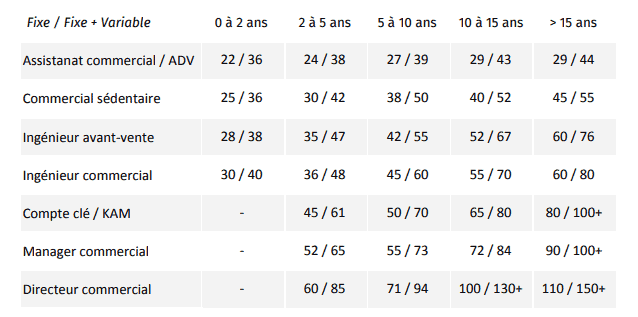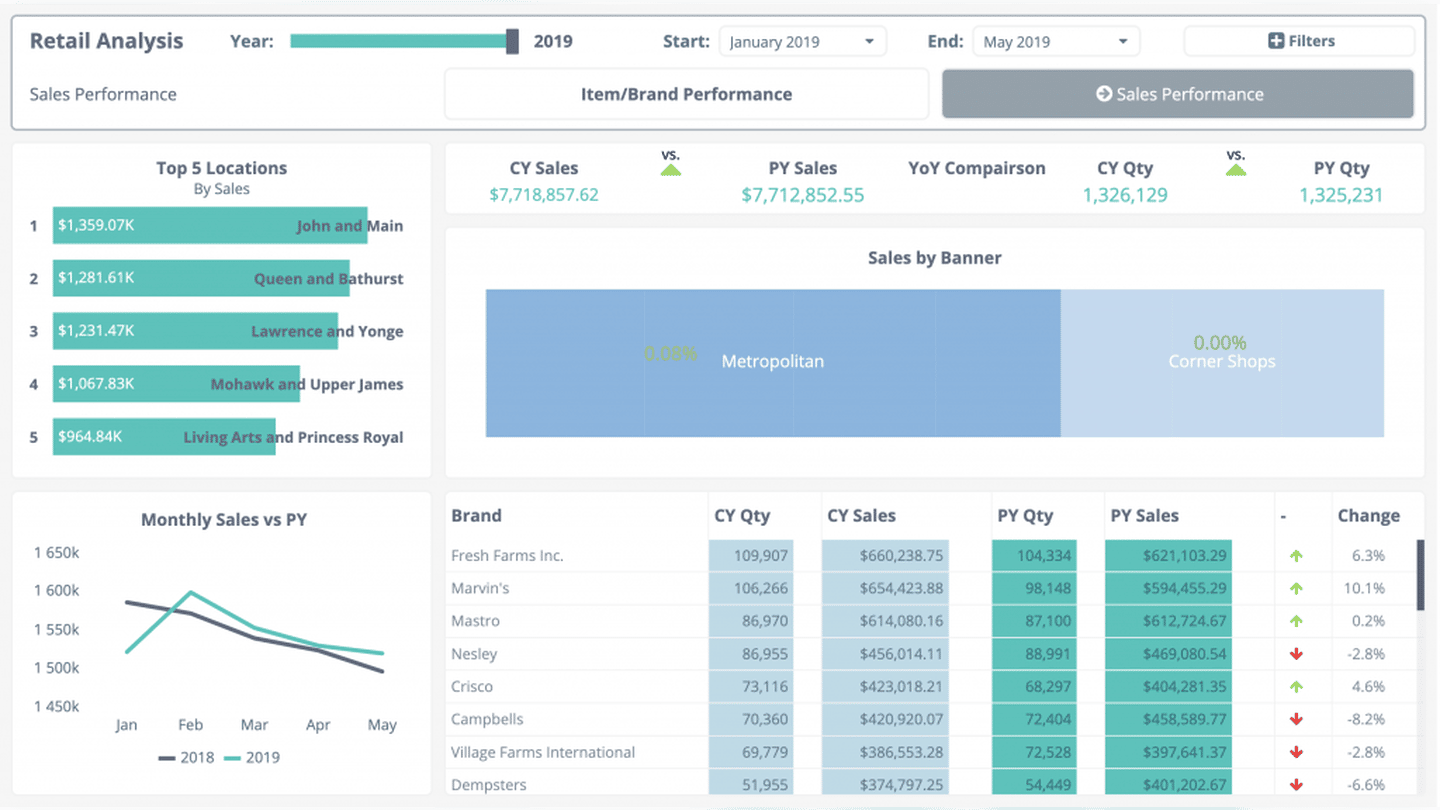As we know, the compensation model is an effective way to direct the efforts of your teams. However, it can be difficult to establish. What are the elements to take into account, and the tips to set up an effective compensation plan? We answer them in 10 questions.
Sommaire
1 Is your commission scheme understood by everyone?
Your compensation system must be fair and equitable. That doesn’t mean that all your salespeople earn the same, but that they all benefit from the same scale and have the same opportunities to earn the maximum bonus.

Therefore, it is essential that your compensation policy is clear and understood by everyone. To do this, set no more than four or five goals (both qualitative and quantitative) and communicate your commissioning plan. This avoids unpleasant surprises and frustrations on the part of your sellers. To do this, you can provide your salespeople with bonus calculation tools such as Excel files or a tool like PaletteHQ to easily simulate their earnings.
In addition, there should be a direct link between the company’s success indicators and the way you pay your salespeople. For example, if you pay your reps on volume or revenue, your compensation plan will not be aligned with your profitability goals and will not compensate reps effectively. So, consider tailoring your compensation plan to the company’s goals so that the two are aligned. In short: the company’s expectations must be clear, and the compensation system, which encourages employees to meet them, must flow directly from this.
2 Are your commissions easy to calculate?
Some compensation systems are complex. For example, scoring systems, which weight a mass of numbers against the performance of the sales force. Or systems that consist of trays that give variable commission rates based on the tiers reached. The problem is that this type of system does not allow you to predict in advance the amount of commission the representative will make by the end of the year. This negatively affects the motivation of the representatives who operate in the short term in their way of seeing the commissions!
Indeed, for them: a sale = a commission, which concretely allows them to buy an item X or Y. You must therefore build your compensation plan according to this behavior, so that it is motivating for your sales representatives.
3 How much of the variable and how much of the fixed?

Your sales representatives, with some exceptions, are paid both a fixed and a variable part. Indeed, fixed remuneration rewards competence, while variable remuneration rewards performance.
The fixed remuneration corresponds at least to the minimum wage of the collective agreement that governs your activity. The market determines this incompressible salary: it is the average of the fixed salaries of the sales representatives observed in your sector of activity. For example, a company operating in a market where salespeople are scarce will tend to apply a higher fixed salary than in a sector where good people are abundant. Use your knowledge of the job market in your sector to highlight your strengths compared to your employer competitors in the same sector.
Once the fixed is determined, the variable must be built. Generally, in the B to B sector, the variable is between 20 and 30%, which leads to a fixed salary of between 70 and 80% of the total salary.
The shorter the sales cycle, the better it is to adopt a system with a low fixed and a high variable, between 40 and 60%. Indeed, in this type of sale, the objectives related to the variable compensation can be quickly reached. On the other hand, on longer cycles, a high fixed (80% or more) is recommended, as the variable’s earnings are more spaced out.
4 How individualized should the goals be?

The sales manager should consider whether he or she wants to standardize or individualize goals. The golden rule: individuals performing the same functions and facing the same responsibilities must be treated the same. On the other hand, we recommend different rates depending on whether your salespeople market distinct offers or deal with specific targets (key accounts, SMEs, individuals, etc.), or whetherthey are sedentary or field-based.
To counter individualism, a good solution is to value both individual and collective performance. Indeed, the latter encourage mutual aid between sales representatives. However, focusing on collective performance allows less successful salespeople to hide behind collective results, hiding their poor individual performance. For this reason, collective objectives should not exceed 20% of variable compensation.
In some cases, different compensation systems coexist for the same population of salespeople, for example when you have entry-level salespeople. In particular, you can set them more flexible and downwardly revised objectives that are “easier” to achieve than others: number of promising contacts, leads generated… In this way, it avoids creating a performance gap, and makes them feel that the effort pays off.
5 Should there be a cap on the compensation plan?
Setting a cap, which may exceed 100%, in the spirit of outperformance is an option often considered in a compensation plan. However, this practice can pose limitations to salespeople, even unconsciously. Moreover, the risk with capping is the “fridge effect”: the salesman, having reached the maximum level, puts his “hot” files aside for the next period, in order to ensure his next performances… To avoid these practices that limit business results, space out the goal periods (six months, for example).
However, the capping technique also has advantages, including the ability to delineate sales capabilities. Indeed, beyond a certain performance, it is very often other economic factors that play in favor of the commercial without being of his responsibility. In addition, the cap can be used as a safeguard when a new compensation policy is implemented and the scales are not yet finalized. Only once you have broken in your system will it work without it.
6 Which calculation method should be used?

There are three main modes of variable calculation:
- The commission (on margin, on turnover…): This system is a percentage of the volume of business achieved by the sales person which is paid to him according to a linear logic: the more I sell, the more I earn. The fixed salary is therefore relatively low (which cannot, in any case, be lower than the minimum wage or the minimum wage of the agreement applied in the company) and the variable remuneration is applied from the first euro.
- Ranking: This involves ranking the sales force from first to last, applying compensation that varies according to the position of each person in the final table. The difficulty is to find the right criteria for classification. However, the ranking does not reflect the performance gaps…. Thus, the first will receive the same amount of variable compensation as the first of the following month, for sometimes very unequal performances.
- Objective-based bonuses: This is a measure of the rate of achievement of the objective set by a salesperson. For example, if the goal is to sell 125 units and the salesperson sells 250 units, he or she will have achieved 200% of his or her goal and will be compensated accordingly. However, this system can encourage salespeople to negotiate their targets downwards and therefore slow down performance.
7 How to value indirect compensation?
There is also another type of compensation called “compensation peripherals”, of which long-term salaries are a part. These include profit sharing, benefits, paid time off, business training, income security programs and other privileges provided by the company to employees….
Companies can opt for this method in the long term to retain their employees. For example, you can set up a profit-sharing bonus, received once or twice a year, based on the percentage of sales achieved. Thus, the longer the employee has been with the company, the greater the amount of the bonus.
Other elements that are not strictly speaking part of the remuneration package can be advantages that can be highlighted to your employees to motivate them and build loyalty. Some examples: meal vouchers, company car, seniority bonus, cell phone, computer, health insurance…
Also, don’t overlook contests and other incentives that come into play. Finally, small, simple and inexpensive gestures such as bouquets of flowers delivered to the workplace, a meal in a great restaurant, or access to training, often prove to be extremely effective.
8 Are pay differentials representative of performance?
In France, employees have a strong culture of achievement, and companies avoid discontent at all costs. As a result, there are often small differences between the different reward levels… which makes variable pay lose its motivating effect!
To be motivated, the “good” salesperson must earn a lot, while the “bad” one will get almost nothing in addition. This principle encourages outperformance. In addition, a real variable policy is motivating for employees because it allows them to really measure their efforts, which are thus rewarded.
The lack of attractiveness of the variable compensation plan causes problems in retaining the best sales people. Indeed, they are motivated by the desire to increase their financial gains and to collect the maximum possible bonus. Thus, if he feels that the products or services he is responsible for selling do not allow him to perform under good conditions, he will resign. A company that loses its salespeople will therefore have to look at the attractiveness of its variable compensation plan and the quality of the products and services it offers.
Many business leaders admit to having non-performing representatives for several years. This costs companies money, without bringing in any! An effective compensation plan that results in diminished performance over a long period of time will cause poor performers to leave the company.
9 Is your compensation plan motivating for all your salespeople?
An effective compensation plan must ensure that all your salespeople are motivated. It must therefore satisfy both the new recruits and the old ones, the high performers and the low performers. Think of it as a way to adapt it to the different situations you may observe among your sales force, and play with the variable and the calculation modes. Again, to be effective, the compensation plan must be fair and equitable, and not penalize anyone.
Also consider how your compensation plan affects the motivation of your salespeople at the end of the month/quarter/year, and whether it ensures that the pipe is full or empty.
10 Is your commissioning plan regularly challenged?
Marketing a new offering, changing business strategy, acquiring a new market… Each time the company decides to move in a new direction, it’s a good idea to reconsider your compensation plan. Ask yourself: is your compensation policy still in line with what you expect from your salespeople? Are the planned objectives still realistic given the current economic situation? It is not a question of starting from scratch, but of adjusting the existing one.
A revision can also be justified in times of crisis. But how can the compensation system be adjusted to keep the sales force motivated without penalizing them? Increasing the fixed salary from 25 to 50% and preferring a variable remuneration based on objectives rather than commissioning will give your sales force confidence in a difficult economic context.
The absence of a variable compensation plan means the absence of real tension. However, an effective variable compensation plan must generate motivational phenomena among employees. The variable compensation plan must “challenge” them and push them to perform.
Furthermore, in some situations, managers are afraid to talk about the variable compensation plan. Often, it’s simply because they don’t understand it. This can be perceived as a lack of transparency! The sales manager must therefore keep in mind that he or she must animate the plan, i.e. make it live on a daily basis and not hesitate to address questions related to calculation errors. A good variable compensation plan should live and should be a topic of discussion in the company!






